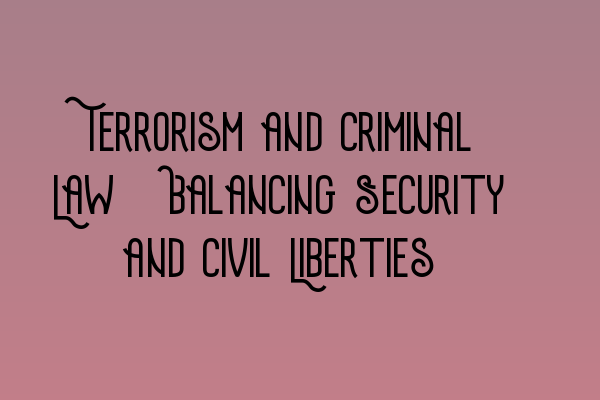Terrorism and Criminal Law: Balancing Security and Civil Liberties
In recent years, the threat of terrorism has become a pressing concern for governments around the world. The rise of extremist ideologies and acts of violence committed by individuals and groups have forced societies to grapple with the difficult task of balancing security measures with the protection of civil liberties.
At SQE Criminal Law & Practice Law UK, we understand the complexities and challenges that arise in this arena. Our team of solicitors is dedicated to upholding the principles of justice while ensuring the safety and well-being of the public. In this blog post, we will explore the delicate balance between counter-terrorism efforts and the preservation of civil liberties.
The Role of Criminal Law in Combating Terrorism
Criminal law plays a crucial role in addressing acts of terror and holding individuals accountable for their actions. It provides a legal framework for investigating, prosecuting, and punishing those responsible for planning and executing terrorist activities. However, it is essential to strike a balance to avoid the excessive use of state power and potential infringements on civil liberties.
One aspect of criminal law that comes into play in terrorism cases is the concept of “reasonable suspicion.” This allows law enforcement agencies to investigate individuals who may represent a threat to national security. While this power is necessary, it must be overseen by robust checks and balances to prevent abuse and protect innocent individuals.
Another vital aspect of counter-terrorism efforts is the gathering and use of intelligence. Law enforcement agencies often rely on advanced technologies and surveillance techniques to gather information about potential threats. However, it is essential to ensure that these tools are used judiciously and in accordance with legal and ethical standards.
The Clash Between Security and Civil Liberties
The clash between security measures and civil liberties is a persistent concern when addressing terrorism within a legal framework. On one hand, governments must take proactive steps to prevent attacks and safeguard their citizens. On the other hand, the erosion of civil liberties can have far-reaching implications for individuals and society as a whole.
One of the most contentious issues is the balance between privacy rights and surveillance. While surveillance can be an effective tool in preventing terrorist activities, it can also infringe on individuals’ right to privacy. Striking the right balance requires robust oversight mechanisms, transparency, and clear guidelines for the use of surveillance techniques.
Similarly, counter-terrorism legislation often grants the state broader powers to detain suspects, impose travel restrictions, and limit freedom of expression. While these measures may be necessary in certain circumstances, they should be subject to regular review and scrutiny to prevent abuses and ensure that civil liberties are not unduly curtailed.
Conclusion
Terrorism presents a significant challenge for criminal law and societies as a whole. Striking the right balance between security measures and the preservation of civil liberties requires careful consideration and a commitment to justice. At SQE Criminal Law & Practice Law UK, we are dedicated to navigating this complex landscape to ensure that the rights of individuals are protected while also maintaining public safety.
If you would like to learn more about criminal law, check out our related articles:
- Demystifying the Solicitors Qualifying Examination Format
- LLC Formation Made Simple: Step-by-Step Guide for UK Entrepreneurs
- Business Regulations in the UK: A Comprehensive Overview
- Preparing for the SQE Exam: Strategies and Resources for Success
- SQE Workshops and Webinars: Accelerate Your Exam Preparation
